Afghanistan Business Summit
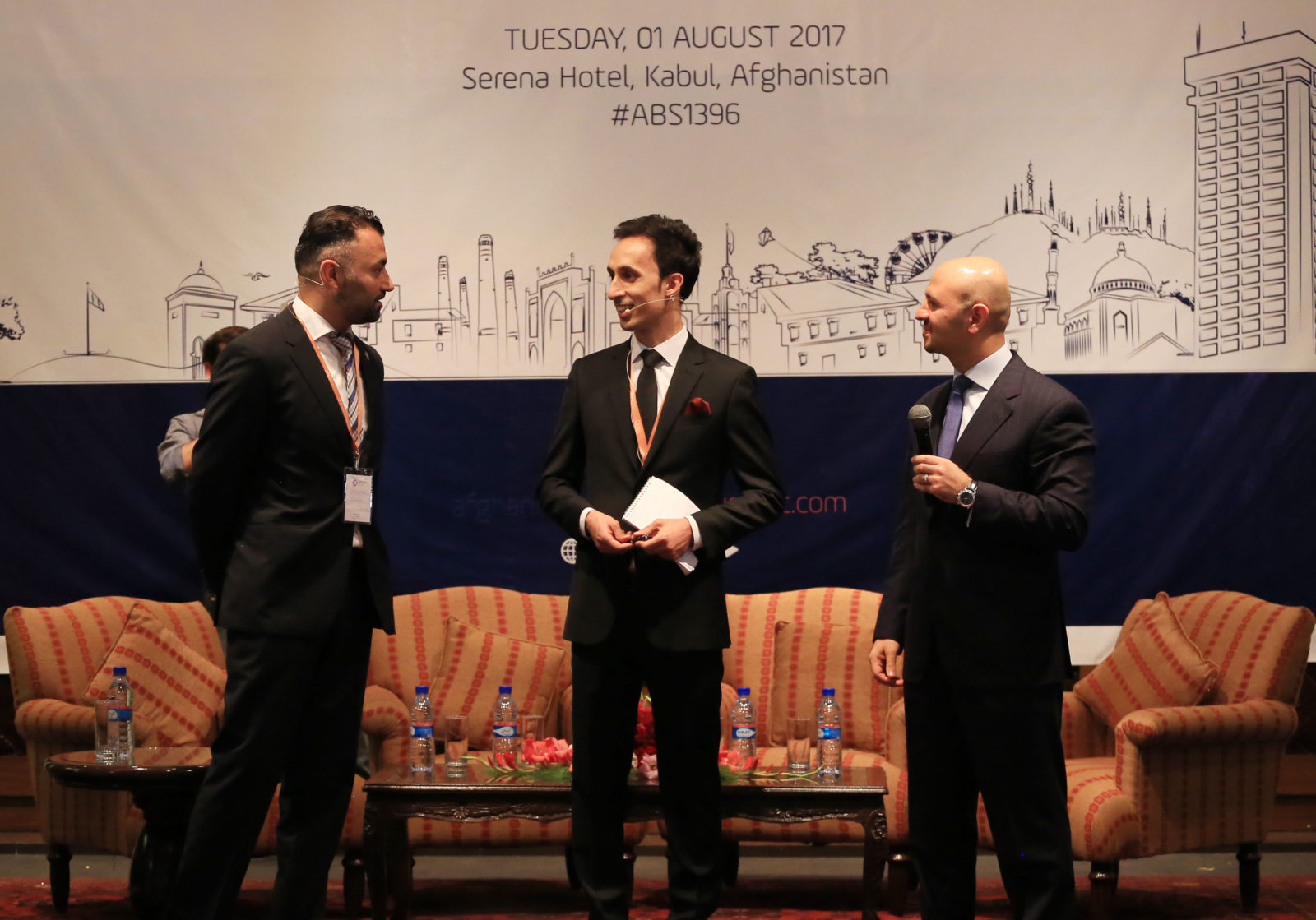
Murtaza Edries
A. Waleed Rashid
Pearl Horizon Consulting (PHC)
On August 1, 2017, the Afghanistan Business Summit (ABS) took place in Kabul Serena Hotel. ABS was an annual day-long gathering of business executives, entrepreneurs, investors and thought leaders aimed at promoting the exchange of best practices, business insights, experiences and investment opportunities in Afghanistan. Through innovative speeches, seminars, practical workshops, presentations, and moments of networking, ABS served as a platform to bring companies, investors, and ideas together as a strong community of successful businesses.

A MESSAGE FROM H.E. PRESIDENT ASHRAF GHANI
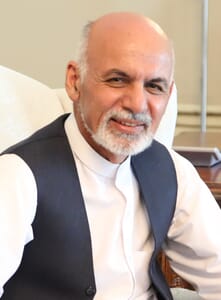
I am happy that Afghanistan’s private sector has taken the initiative to come together & discuss business opportunities, best practices, & experiences. I appreciate the organizers & supporters of Afghanistan Business Summit in bringing together the leaders of the business community in Afghanistan.
We have shown through economic agendas that Afghanistan’s government is serious about & competent in crafting & implementing major economic reforms & development projects.
Afghanistan government’s future plans in the economic sector include:
- Major reforms in the relevant government offices
- Investment in infrastructure
- Improvement in cross-border trade
- Increase in electricity production & distribution
- Development of stronger regional connection to foster trade & investment in Afghanistan
Some of our achievements include:
- We have 3 active railway lines.
- We established one air corridor to help the traders export their products easily.
- We built wide and long roads to connect different parts of the country.
- The launch of Salma Dam was the biggest megaproject in the past 40 years.
The partnership between Afghanistan government & private sector businesses through various means such as Public-Private Partnerships (PPPs) is very essential in development, implementation, & sustainability of megaprojects that can generate economic growth, create jobs, & increase the country’s revenue.
VIDEO MESSAGE FROM SAAD MOHSENI

Representing MOBY Group, Mr. Saad Mohseni provided a video message to the audience of Afghanistan Business Summit.
For a full story and details of MOBY Group’s success, see page 42.
“ABS serves as the catalyst to make ‘sharing’ a business requisite.”
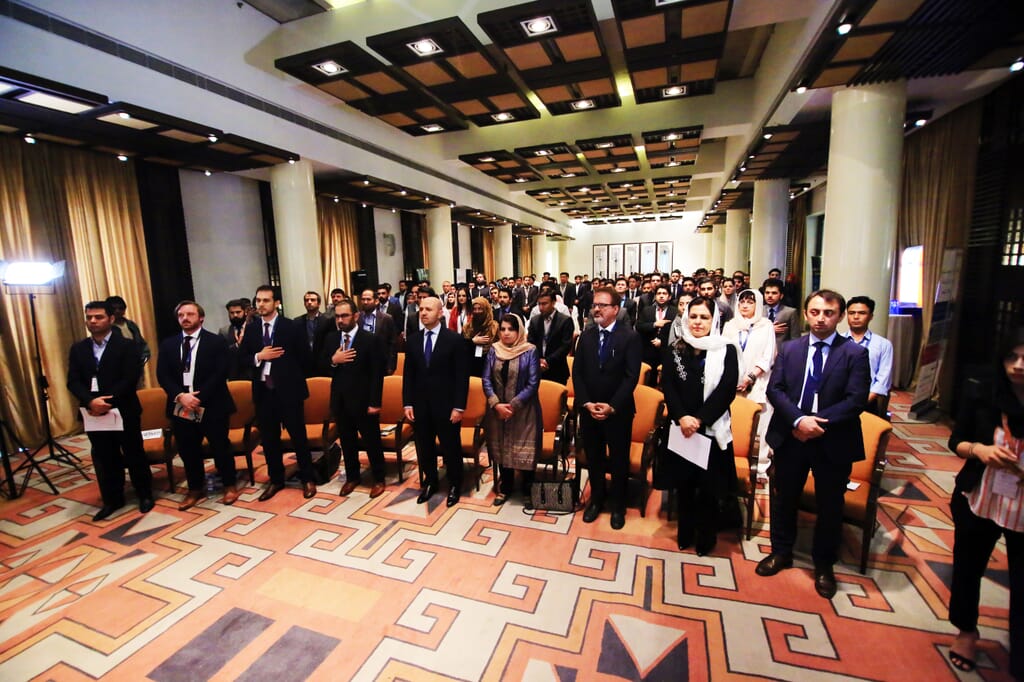
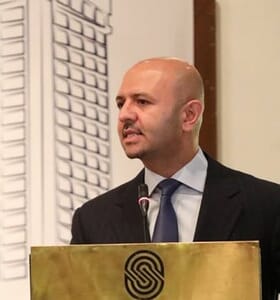
KEYNOTE SPEECH BY H.E. MINISTER SADAT MANSOOR NADERI
What a great idea! We fully endorse the ABS and suggest to organize it every year. I am confident every sector needs a summit like this one.
We all know and understand what kinds of challenges businesses face in Afghanistan. Security, abductions, corruption, lack of sufficient infrastructure, limited access to finance, rule of law, etc. Dealing with these add to businesses’ costs and unfortunately, these problems ultimately affect the quality of goods and services supplied to the market. But I have been asked to speak as an entrepreneur, so I will focus on discussing solutions & opportunities for the business community.
I think there are certain characteristics to a successful entrepreneur. The first one is the ability to identify a market need and see a business in it. Second, it’s luck. Being at the right time in the right place is important. The third is persistence. Giving up shouldn’t be an option for you.
Before starting the insurance business, Insurance Corporation of Afghanistan (ICA), many discouraged us that it won’t work in Afghanistan. We weren’t sure. We did our research and concluded that regardless of the country’s situation, there was a need for strong insurance providers. We began well though. We partnered with Llyod’s of London, the most reliable insurance company in the world. After about a decade, we have collected over 100 million USD in premium from the Afghanistan market. In aggregate, we insured over 30 billion USD worth of assets. We have paid every single claim, which sums to about 10 million USD over these years. As you see, insurance works here, despite the dire situation in the country. Now we have international investors wishing to invest in our company. Why did we succeed? We built the right infrastructure. We paid our taxes. Recruited a qualified team and did an ethical business.
Back in the day, we noticed people coming to Kabul from Dubai and elsewhere with luggage of food items. We were amazed by how the basics were not easy to find in Afghanistan. We saw the need but conducted market research. We created the Finest, the first chain supermarket in Afghanistan. But we brought an executive of Tesco from the UK to help us build the Finest’s model. It also worked and as you see many more investors have built their own supermarkets in the country. Our winning factor for Finest was being data-driven. Data is absolutely essential for an investor. Without numbers, investment is irrational.
Let’s review some numbers. About 15 years ago, only 10% of Afghan people lived in cities. Now it’s 33-35%. In 10 years the projections are, 50% of Afghanistan’s population will live in cities. We are one of the countries that is rapidly growing its urban population. Secondly, 50% of the Afghan population is under the age of 15. About 80% of Afghans are under the age of 35. We are one of the youngest countries in the world. In terms of communication and technology, it’s an opportunity itself.
This is why we need 2 million affordable houses to meet the urban population growth. We need 40,000 affordable houses every year. The question is how to build a housing structure that ordinary people can pay for? That’s opportunity. Investing in housing, such as development of mortgages, creates employment and has the multiplier effect to many other sectors. Sooner or later, mortgages will bring a housing revolution in the country where thousands of people will have proper housing. Another opportunity is using prefabricated technology for housing.
We have many different opportunities in the urban Afghanistan. We have opportunities in the fields of recycling, transportation, commercials, wastewater management, etc. Find partners and come to us and we’ll try to help you as much as we can.
To answer the question of where would I invest in the next five years, I would say in technology. Obviously my role is in government and I am not investing now. But I do believe technology is the future. Look at Google, Apple, Twitter, and Amazon. Technology companies are the leading businesses in the world today. Social Media is growing rapidly in the world and with 80% of our population under 35 years old, Afghanistan is one of the youngest countries in the world. I think telecommunication another sector I would like to invest in as well. Of course, mining is a high potential sector but requires very long-term investment.
I sincerely appreciate Afghanistan Business Summit’s work and wish the organizers and the audience great success.
Panel Topic |
What does it take to build and sustain a successful business in Afghanistan?

AKBAR ARGHANDIWAL
CEO of Synergy Solutions Afghanistan
Persistence. Nothing comes easy. If you want to do something in life, work hard, study hard. It is said that an entrepreneur on the average fails 16 times before they triumph. I’ve failed more than that and every time I did I told myself “I know I can.” I’ve learned a lot from my failures.

KAMILA SIDIQI
Deputy Minister of Commerce of Afghanistan
When I first started my taxi company, Kaweyan Cab, I got 3,800 positive feedbacks from people; mostly men; supporting me as a woman who started a business. Our society has come to this conclusion today that it doesn’t matter what gender you are, you can be successful in business. We should also focus on our local market and invest in our own country. My success factors were being objective, persistent, confident, committed, and honest.
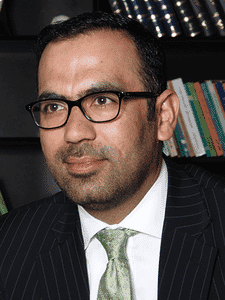
SAEEQ SHAJJAN
AIBA Licensed Attorney, Founder of Shajjan Law
Transparency, trust, persistence; these are the principles that everyone should pay attention to or they wouldn’t last long. Prior to starting a business, the market should be studied and evaluated.

SHAHLA NAWABI
Founder of Sarra Design Afghanistan
For me the most important thing is to have a great name in business. As somebody that is honorable, somebody that does a good job and somebody that you can trust. In business, you have to diversify, you have to be willing to change.
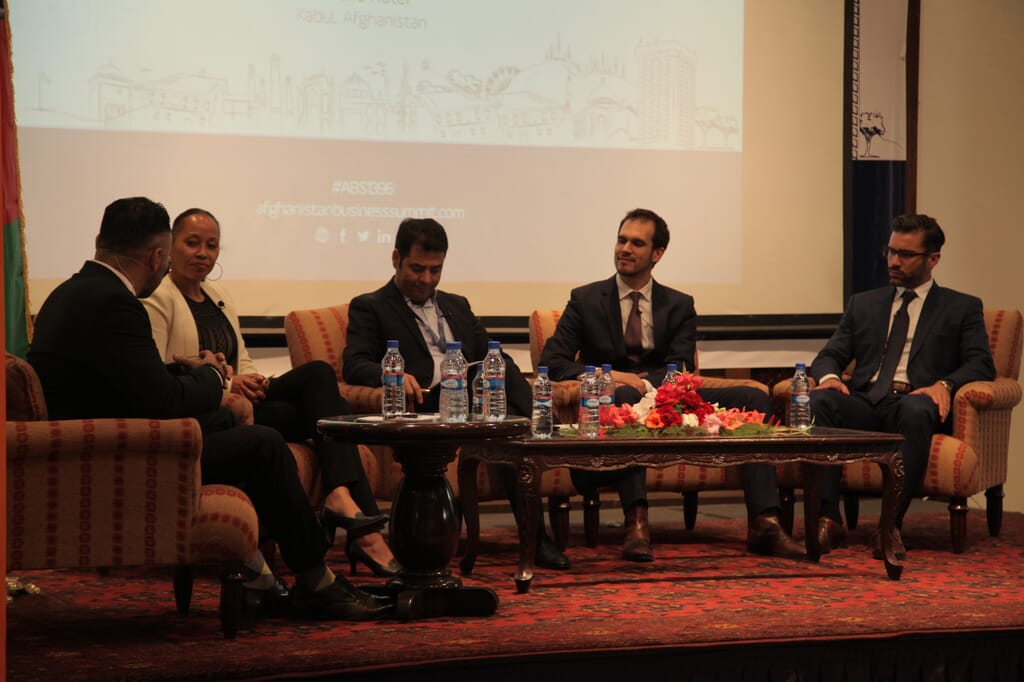
Panel Topic |
What are the top business opportunities in the next 10 years in Afghanistan?
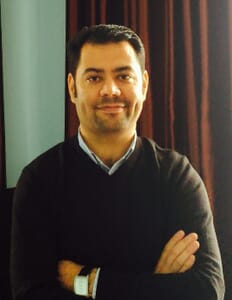
JAWED HAMDARD
Business Development Director of Cyberaan Ltd
Information communication technology is a blueprint for social economic development. Our geography for the first time can serve as a blessing – we can literally serve as the interconnectivity hub for the internet backbone in the region and be an information society.
My recommendation is to bridge the gap between the classroom and the market, especially in ICT sector, where everything changes so rapidly. By the time students graduate learning about Windows XP we are already running windows 10 in the market. The academic and scientific ways of business should be taught. It’s exactly the difference between a typical business and entrepreneurship. A businessman tries to create profit but an entrepreneur creates value.

SANZAR KAKAR
CEO Afghanistan Holding Group
We don’t need an invention or a breakthrough. To do business here, we need to get the basics right, like chicken and bread!
Agriculture is a key investment. I would open dairy operation and get farm fresh milk. We import chicken from Brazil, the other side of the world! We should do it ourselves. The Ministry of Agriculture has programs that cover 80-85% of your investment cost, so money is also there! SILO is good too; there is considerable demand there. Besides these, cold storage, pharmaceutical industry and IT services are top business opportunities in the country.
One of the biggest challenges in business in Afghanistan is finding competent technical capacity. To build a capacity we have to start from a very young age. 40 years of war has caused a vacuum in education and we’re trying to fill it. So, we invested in the education sector, not for the profit but to make a difference in the community. Another problem is that nobody buys our own products. I went to a wonderful PVC pipes company in Mazar where they made the highest quality pipes but stamped ‘Made in Iran’ on it because they said no one would buy domestic products. If Afghan consumers pay more for Afghan domestic products, importers e will go out of business and that will make Afghan businesses sustainable. We have to be initiators to protect our own country, our own brand, & our own fellow businessmen.

JOSEPH MEHRABI
Professor at American University of Afghanistan Principal, Private Equity at INFRONTIER Ltd
We have invested in the healthcare sector because there is a multimillion dollar market where thousands of Afghans go to India and Dubai for treatment on a weekly basis. So, we are trying to reduce Afghans going abroad for simple treatments that we can do here in Afghanistan. We have also invested in oil and gas, mining, and financial services.

KIM MOTLEY J.D.
CEO & Founding Partner Motley Legal Services
The legal side of businesses is really important in Afghanistan. Supporting international businesses in compliance with Afghan laws and regulations has been an interesting area of work for us. Corporate social responsibility must grow in Afghanistan and businesses must participate in development of the country. We provide pro bono legal services for our belief in social work.

Panel Topic |
How can the government, the private sector, and the donor community work together to make doing business easier in Afghanistan?
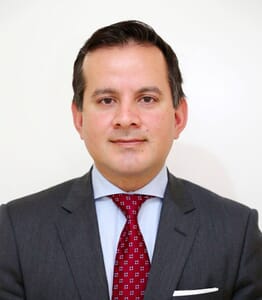
AJMAL AHMADI
Senior Advisor to the President of Afghanistan on Banking and Finance
This is an opportune time to discuss the topic of collaboration. I think the business community has noticed the change in tone, and the change in approach, the government is taking to engage the private sector. A couple of practical changes that should be in place to make the day-to-day life of businesses easy are a visa on arrival for business visitors- finalizing this year, and easier authentication process for businesses coming from abroad. If we are to bring investors from abroad, we should make things simpler for them, not harder. Creation of a one-stop-shop is another step we plan to implement.
In terms of policies, I hear your complaints about taxes, obtaining land, and accessing electricity. We receive requests for lower tax rates, land, and reliable electricity. These are real issues here. In 2014, Afghanistan faced serious fiscal crisis. IMF placed a lot of pressure on the government to raise the revenue and that’s why there are complaints about increased BRT, telecom tax, etc. But I will tell you the worst thing for the business community is if there’s no macroeconomic stability. So we had to balance here!
In terms of access to land, I know there’s a lot to be done on industrial parks. But industry structure is something that needs to improve as it, research shows, can drive profitability. Regulatory bodies, such as pharmaceutical regulatory body, are interventions we’re working on.
Public Private Partnerships (PPPs) is a new area for Afghanistan and it’ll take time. The initial focus is on power sector and it leverages private capital to increase power supply. PPPs are challenging but once passed the initial stages, they provide good potential for improving services.
In terms of infrastructure, about 5 years ago there were no railways in Afghanistan. Now we have three. We’re connected to Iran, Turkmenistan and Uzbekistan. We’ve had extensive discussions about telecom sector. We just passed the open access policy. Not only that but we actually passed the pricing for that. The initial pricing when we started those discussions was $5,000,000 per license. Then it went to $500,000. The final version that was approved by economic council was $100,000. One third of that for regional licenses and one-ninth of that for city-wide licenses. So, when you’re talking about supporting the economic sector, we understand it and it’s something we’re moving forward positively.
In term of what we’d like to see from the private sector, first I would say the quality of business proposals that come to us could improve. We receive a lot of business plans without any financing plan, strategy, company history, background of the company management, etc. Second, we request that you respect the process. If we want to build a strong foundation, it has to be on the foundation of strong institutions and strong processes from both sides. Third, we need some more strong industry associations. We’d like to see an association from every single industry that becomes self-regulatory and is able to be partners with the government. There’s more on afghaeconomics.com to learn about the Afghan economy.
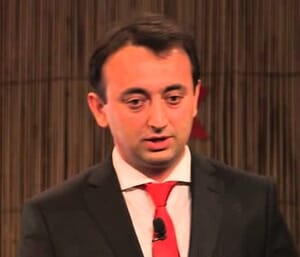
FARSHID GHYASI
Founder/CEO NETLINKS LTD.
The open access policy and the reduced pricing on licenses will have immense affect on the price of internet in Afghanistan and that’s the kind of policies and improvements we would like to see from the government. PPPs offer excellent potential for private sector companies to share business ideas and opportunities with the government that the private sector wouldn’t be able to invest in on its own. These partnerships can generate 100s of millions of dollars in revenue and many jobs. When the PPP framework came out, we thought this is it. But it wasn’t really beneficial to our company as there was no guarantee that if we shared business proposals, we would be the one to have the benefits. The proposal would be publicly tendered with only 5% preference to the originator of the idea.
There are great initiatives coming out from the government, but there is significant room for improvement as multiple government entities involve in projects and at times it can serve as a hurdle. The government should focus on enabling the private sector and in return, the private sector will contribute to the government’s revenues.

MALALAI WASSIL
#ABS1396 is the first forum that has been put together by an Afghan without any financial support from donors or the government. We have started it, now let’s see how we can take it into our friends, into our networks, maybe we create groups, maybe we take it into the villages. Let’s put together our efforts and try and I’ll guarantee you’ll have the answer in terms of the role that you individually are supposed to be playing.
Your personal purpose in very crucial in the success of your business. But what is driving you? Is it the need to have control and certainty, or the need to have significance on papers? I suggest that you add two more personal drivers. The need to serve and the need to grow.






Hey. This is great. I like the discussions.
Nice topic